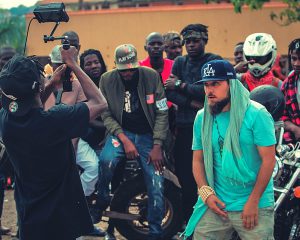Monk.E seems excited and a little out of breath when we reach him by phone in Uganda. It’s shaping up to be a special day, since not only will it be the coda to his six-month-long trek in Africa, but it’s also the end of recording of a collaborative album with Nutty Neithan, a star of the Kampala music scene, and rising star of the international dancehall scene.
“We already have eight songs in the can, and we’re recording the last two,” he says. “It’s going really well so far, we’re totally on the same vibe. He’s in a spiritual and philosophical mindset that’s deeply influenced by Rasta culture. We really connect on that.”
A few months ago, the Montréal-based artist connected with Zex BilangiBilangi, another singer with a rising star. Launched in May, Souffrir avec le sourire aux lèvres (Suffering with a Smile on Your Lips) – an album that includes songs sung in French, English, Luganda, and Spanish, with music at a crossroads of dancehall, afrobeat, and rap – is also the fruit of an intense cultural and human connection.
“We started freestyling the minute we met,” says Monk.E. “It was magical. He introduced me to new forms of music that I would never have explored otherwise. I don’t want to sound cliché, but I feel like there was some divine intervention in that acquaintance. Music naturally drew me to talk with Zex about his culture. And as I always do when I collaborate with someone, I adapted my discourse to his.”
In this case, the adaptation process was quite a challenge for the thirtysomething rapper and graffiti artist who, over the course of eight solo albums, had us accustomed to his shrewd, lucid lyrics full of social, political, and spiritual reflections, all shaped by his extensive travel. “Let’s just say I was not used to talking about women that much,” he says. “But with Zex and dancehall, it was appropriate for an album.”
Marketing was another laboratory filled with discoveries. “Marketing in Kampala is miles apart from what we know in Québec,” says Monk.E. “Your number of streams doesn’t mean much. Everything is street-based, you have USB keys going from one Internet café to the next, and their content is loaded onto cell phones. You don’t spend money on videos, you give it to promoters and DJs so that they’ll play your music.”
The rapper astutely used his “new entries” to have his music heard all over Kampala. “I saw people repeating the syllables of my lyrics in the street, which is funny and quite surprising, because French is barely understood here,” he explains, stressing the universal appeal of music, and the close proximity between his state of mind and that of his fellow citizens. “I feel like I can express myself more, here, even though we don’t speak the same language. Ugandans are very colourful, and they do everything with passion. I made a lot of people uncomfortable in Québec with my high level of expression, but over here, everyone cultivates that kind of eccentricity.”
 Good old Monk.E – the one who delivers his message songs with biting intensity – can be heard on “Le changement,” the opening track of Souffrir avec le sourire aux lèvres. The title refers as much to his new musical colours as it does to his perspective on international politics, especially those of Uganda.
Good old Monk.E – the one who delivers his message songs with biting intensity – can be heard on “Le changement,” the opening track of Souffrir avec le sourire aux lèvres. The title refers as much to his new musical colours as it does to his perspective on international politics, especially those of Uganda.
“We have to question ourselves more than ever about who we are and the way we interact with the planet,” he says. “It’s a little more taboo of a subject here, but the president has been in power for over 30 years [Yoweri Museveni, since 1986]. The people are hungry and they want change, and Zex is actively campaigning for that change.”
Dubbed the “Prime Minister of the ghetto,” Zex BilangiBilangi has many affinities with Bobi Wine, a pillar of the Ugandan dancehall and afrobeat scenes, who’s dubbed “President of the ghetto.” Elected three years ago, Wine is one of the youngest representatives in the Ugandan parliament, and he’s the leader of an opposition party to Museveni (People Power, Our Power).
As a matter of fact, it’s in Wine’s studio – he’s still active on the music scene – that Monk.E and Zex recorded their album. “I painted three or four times for him, and he let me record at his place in exchange,” says the Montréaler who, because of this association, had to go through a few hardships the last time he visited Uganda. “Some people thought that my music was financed by the Ugandan opposition… And it’s partly why, after talking with people in the industry, I quickly understood my association with Bobi Wine would need to remain purely artistic. I have to be very careful not to involve his party in this.”
So, after visiting the country seven times, Monk.E is growing accustomed to Uganda, a place he now considers his home. “I’m really happy with the choices I’ve made,” he says. “I’ve grown artistically, socially, and on a human level, here. I love feeling supported by the public. People are adding me on social networks, I’m often recognized on the street… All this recognition, this sharing, and these friendships feed my creativity and permeate my art. I hope that’s also what awaits me in Québec.”